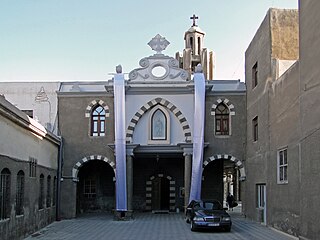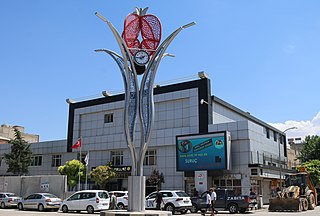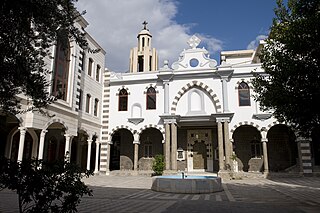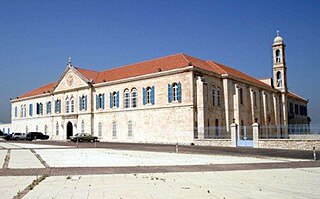Related Research Articles

The Syriac Catholic Church is an Eastern Catholic Christian jurisdiction originating in the Levant that uses the West Syriac Rite liturgy and has many practices and rites in common with the Syriac Orthodox Church. Being one of the twenty-three Eastern Catholic Churches, the Syriac Catholic Church is a self-governed sui iuris particular church, while it is in full communion with the Holy See and with the entirety of the Roman Catholic Church.

An exarch was the holder of any of various historical offices, some of them being political or military and others being ecclesiastical.

The Melkite Greek Catholic Church, or Melkite Byzantine Catholic Church, is an Eastern Catholic church in full communion with the Holy See as part of the worldwide Catholic Church. Its chief pastor is Patriarch Youssef Absi, headquartered at the Cathedral of Our Lady of the Dormition in Damascus, Syria. The Melkites, who are Byzantine Rite Catholics, trace their history to the early Christians of Antioch, formerly part of Syria and now in Turkey, of the 1st century AD, where Christianity was introduced by Saint Peter.

Suruç is a municipality and district of Şanlıurfa Province, Turkey. Its area is 744 km2, and its population is 100,961 (2022). It is on a plain near the Syrian border 46 kilometres (29 mi) southwest of the city of Urfa.

Mar Ignatius Gabriel I Tappouni was a leading prelate of the Syriac Catholic Church. He served as Patriarch of Antioch from 1929 to 1968, and was elevated to the cardinalate in 1935.
Ignatius Peter VIII Abdalahad was patriarch of Antioch and all the East of the Syriac Catholic Church. He served as patriarch from 2001 to 2008, when he resigned and retired.
The Syriac Catholic Church, established in the second half of the 17th century as an Eastern Catholic offshoot of the Syriac Orthodox Church, had around a dozen dioceses in the eastern provinces of the Ottoman Empire in the 18th and 19th centuries. Three of these dioceses were ruined during the First World War in the Assyrian and Armenian massacres, and the 20th century also saw the growth of an important Syriac Catholic diaspora in America, Europe and Australasia. As of 2012 the Syriac Catholic Church has fifteen dioceses, mostly in the Middle East, and four patriarchal vicariates for the diaspora communities.
The Council of Catholic Patriarchs of the Orient is an agency of the Catholic Church that meets the patriarchs of Eastern Catholic Churches and the Latin Patriarch of Jerusalem. Permanent seat of the organisation is the Maronite Catholic Patriarchate of Antioch in Bkerke, Lebanon.
Paul Nabil El-Sayah is an Archeparch of the Maronite Church and Curial Bishop of the Maronite Catholic Patriarchate of Antioch.
The Syriac Catholic Patriarchal Exarchate of Lebanon was a short-lived 20th-century jurisdiction of the Eastern Catholic Syriac Catholic Church in the Patriarch's own host country, Lebanon.
Maronite Catholic Patriarchal Exarchate of Jerusalem and Palestine is an exarchate of the Maronite Patriarchate of the Maronite Church immediately subject to the Patriarchate of Antioch of the Maronites. In 2017 there were 504 members. It is currently governed by archeparch Moussa El-Hage, OAM.
The Armenian Catholic Patriarchal Exarchate of Jerusalem and Amman is the missionary pre-diocesan jurisdiction of the Armenian Catholic Church sui iuris in the Holy Land (Palestine/Israel) and (Trans)Jordan.
The Syriac Catholic Archeparchy of Aleppo is a Syriac Catholic Church ecclesiastical territory or archeparchy of the Catholic Church in Syria. The Archeparchy of Aleppo is not a metropolitan see and is exemption directly to the Syriac Catholic Patriarch of Antioch.
The Syriac Catholic Eparchy of Cairo is a Syriac Catholic Church ecclesiastical territory or eparchy of the Catholic Church in Egypt. It is immediately exempt to the Syriac Catholic Patriarch of Antioch, though not part of his or any other ecclesiastical province.

The Syriac Catholic Archeparchy of Damascus is a Syriac Catholic Church ecclesiastical territory or eparchy of the Catholic Church in Syria. While a metropolitan see, the Archeparchy of Damascus is without suffragans and is exempt directly to the Syriac Catholic Patriarchate of Antioch. It has its cathedral in the archepiscopal see and Syrian national capital Damascus.

The Syriac Catholic Patriarchal Eparchy of Beirut is a Syriac Catholic Church ecclesiastical territory or eparchy of the Catholic Church in Lebanon. The Syriac Catholic Patriarch of Antioch's cathedra is found in the eparchy in the episcopal see of Beirut, the capital of Lebanon.

The Maronite Catholic Patriarchate of Antioch is the seat of the Patriarch of the Maronite Church. It is currently governed by the Patriarch Cardinal Bechara Boutros al-Rahi, OMM.
The Syriac Catholic Archeparchy of Baghdad is a Syriac Catholic Church ecclesiastical territory or archeparchy of the Catholic Church in Iraq. It is not a metropolitan see and is directly exempt to the Syriac Catholic Patriarch of Antioch, though not part of his or any other ecclesiastical province, and in Rome depends on the Congregation for the Oriental Churches.
Catholic dioceses in the Holy Land and Cyprus is a multi-rite, international episcopate in Israel and Cyprus.

The Maronite Church is an Eastern Catholic sui iuris particular church in full communion with the pope and the worldwide Catholic Church, with self-governance under the Code of Canons of the Eastern Churches. The head of the Maronite Church is Patriarch Bechara Boutros al-Rahi, who was elected in March 2011 following the resignation of Patriarch Nasrallah Boutros Sfeir. The seat of the Maronite Patriarchate is in Bkerke, northeast of Beirut, Lebanon. Officially known as the Antiochene Syriac Maronite Church, it is part of Syriac Christianity by liturgy and heritage.
References
- ↑ "From the Oriental Churches, 28.03.2020" (Press release). Holy See Press Office. 28 March 2020. Retrieved 28 March 2020.
